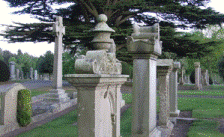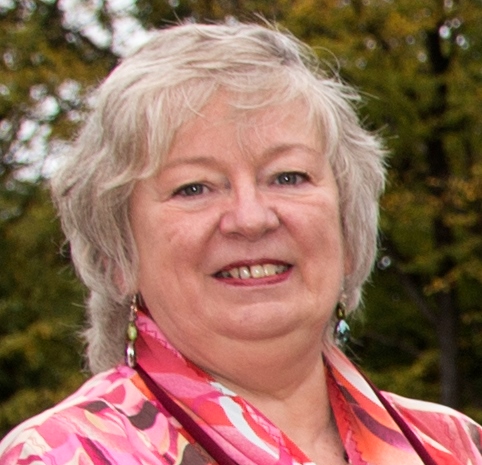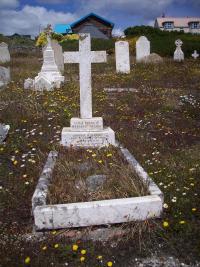- Birth*: Augustus Nicholas Fleuret gaucho, gardener was born circa 1848 at Paris, France,
 ; Augustus Nicholas FLEURET was born circa 1848 in Paris, France.1
; Augustus Nicholas FLEURET was born circa 1848 in Paris, France.1 - (Groom) Marriage*: He married Margaret Ellen Warren on 13 October 1870 at Trinity Church, Stanley, Falkland Islands,
 ; Augustus, a gaucho from Paris, France, living in No 11 Pensioners Cottage, was married to Margaret Ellen WARREN, widow from England also living in No 11 Pensioners Cottage, 13 October 1870 at Trinity Church Stanley according to the Rites and Ceremonies of the Church of England after Banns by Charles Bull MA Colonial Chaplain. The witnesses were C Dagenahardt, Harriet White and Elizabeth Dagenhardt. Augustus’ father was recorded as Augustus Nicholas Fleuret, deceased baker of Paris, and Margaret’s as Martin Dwyer, soldier.1
; Augustus, a gaucho from Paris, France, living in No 11 Pensioners Cottage, was married to Margaret Ellen WARREN, widow from England also living in No 11 Pensioners Cottage, 13 October 1870 at Trinity Church Stanley according to the Rites and Ceremonies of the Church of England after Banns by Charles Bull MA Colonial Chaplain. The witnesses were C Dagenahardt, Harriet White and Elizabeth Dagenhardt. Augustus’ father was recorded as Augustus Nicholas Fleuret, deceased baker of Paris, and Margaret’s as Martin Dwyer, soldier.1 - Death*: Augustus Nicholas Fleuret gaucho, gardener died on 19 February 1930 at East Dulwich, Kent, England,
 ; Augustus, age 82, died 19 February 1930 in East Dulwich and was buried in Bromley Cemetery. [Obituary Penguin 25 Apr 1930]1
; Augustus, age 82, died 19 February 1930 in East Dulwich and was buried in Bromley Cemetery. [Obituary Penguin 25 Apr 1930]1 - Immigration*: He immigrated circa 1862 to Falkland Islands,
 . Augustus came to the Falkland Islands circa 1862 as a boy of about 14 or 15 and for many years worked in Stanley for Captain and Vere Packe.1
. Augustus came to the Falkland Islands circa 1862 as a boy of about 14 or 15 and for many years worked in Stanley for Captain and Vere Packe.1 - (Informant) Death: He registered the death of Margaret Ellen Warren on 22 September 1898 at Stanley, Falkland Islands,
 ; Margaret Helena, age 49, died 20 September 1898 from tubercular peritonitis and was buried 22 September 1898 in Grave C 262.1,2
; Margaret Helena, age 49, died 20 September 1898 from tubercular peritonitis and was buried 22 September 1898 in Grave C 262.1,2
- Emigration*: Augustus Nicholas Fleuret gaucho, gardener emigrated with Augustus Nicholas Fleuret gaucho, gardener on an unknown person after 22 September 1898 at England,
 ; Augustus moved to the UK sometime after this.1
; Augustus moved to the UK sometime after this.1 - Address*: As of between 1 May 1900 and 1 November 1906, Augustus Nicholas Fleuret gaucho, gardener lived at an unknown place ; In May 1900 he was living at Villi Veta, 34 Freelands Road, Bromley, Kent and was still there 1 November 1906.
- (Groom) Marriage*: He married Margaret Ellen Warren on 13 October 1870 at Trinity Church, Stanley, Falkland Islands,
 ; Augustus, a gaucho from Paris, France, living in No 11 Pensioners Cottage, was married to Margaret Ellen WARREN, widow from England also living in No 11 Pensioners Cottage, 13 October 1870 at Trinity Church Stanley according to the Rites and Ceremonies of the Church of England after Banns by Charles Bull MA Colonial Chaplain. The witnesses were C Dagenahardt, Harriet White and Elizabeth Dagenhardt. Augustus’ father was recorded as Augustus Nicholas Fleuret, deceased baker of Paris, and Margaret’s as Martin Dwyer, soldier.1
; Augustus, a gaucho from Paris, France, living in No 11 Pensioners Cottage, was married to Margaret Ellen WARREN, widow from England also living in No 11 Pensioners Cottage, 13 October 1870 at Trinity Church Stanley according to the Rites and Ceremonies of the Church of England after Banns by Charles Bull MA Colonial Chaplain. The witnesses were C Dagenahardt, Harriet White and Elizabeth Dagenhardt. Augustus’ father was recorded as Augustus Nicholas Fleuret, deceased baker of Paris, and Margaret’s as Martin Dwyer, soldier.1 - Note for Web*: Augustus Nicholas Fleuret gaucho, gardener Gaucho
From Wikipedia, the free encyclopedia
For other uses, see Gaucho (disambiguation).
Gaucho (Spanish: [??aut?o]) or gaúcho (Portuguese: [?a?u?o]) is a word with several meanings. In its historical sense a gaucho was one "who, in the 18th and 19th centuries, inhabited Argentina, Uruguay and Rio Grande do Sul in Brazil".[1] Today, in Argentina and Uruguay, a gaucho is simply "A country person, experienced in traditional cattle ranching work".[2] Because historical gauchos were reputed to be brave, if unruly, the word is also applied metaphorically to mean "Noble, brave and generous",[3] but also "One who is skilful in subtle tricks, crafty".[4] In Portuguese the word gaúcho (note the accent) means "An inhabitant of the plains of Rio Grande do Sul or the pampas of Argentina descended from European man and [Amer]Indian woman who devotes himself to lassoing and raising cattle and horses";[5] and in Brazil gaúcho has also acquired a metonymic signification, meaning anyone, even an urban dweller, who is a citizen of the State of Rio Grande do Sul.[6] In its purest sense, gaucho referred to the nomadic, often outlaw inhabitants of the great plains of Argentina, Uruguay and Brazil. In current usage, gaucho usually designates the rural working class in general."[7]
The gaucho in some respects resembled members of other nineteenth century rural, horse-based cultures such as the North American cowboy (vaquero, in Spanish), the Chilean huaso, the Venezuelan or Colombian llanero, the Hawaiian paniolo,[8] and the Mexican charro.
The gaucho is a national symbol in both Argentina and Uruguay. Gauchos became greatly admired and renowned in legends, folklore and literature and became an important part of their regional cultural tradition. Beginning late in the 19th century, after the heyday of the gauchos, they were celebrated by South American writers.
References
Dictionary of the Royal Spanish Academy, Gaucho, sense 5.
Dictionary of the Royal Spanish Academy, Gaucho, sense 6.
Dictionary of the Royal Spanish Academy, Gaucho, sense 1.
Dictionary of the Royal Spanish Academy, Gaucho, sense 4.
Dicionário Priberam da Língua Portuguesa, Gaúcho.
Oliven, Ruben George (2000). ""The Largest Popular Culture Movement in the Western World": Intellectuals and Gaúcho Traditionalism in Brazil". American Ethnologist. Wiley for the American Anthropological Association. 21 (1): 128–146., p.129.
Shumway, 12.
Slatta, Auld and Melrose..4 - [S49] Website Web Site online (www.) Falkland Islands Government, Jane Cameron National Archives http://www.fig.gov.fk/archives/index.php/online-collections/people/19th-century-families/d-to-i
Jeremy Moore Avenue, P.O. Box 687, Stanley, Falkland Islands, FIQQ 1ZZ
e-mail address [Oct 2016]. - [S43] PCC - AC photograph album.
- AC photograph album
- [S29] https://en.wikipedia.org/wiki/Gaucho [Oct 2016].
Augustus Nicholas Fleuret gaucho, gardener1
M, #14405, b. circa 1848, d. 19 February 1930
Last Edited: 14 Jun 2024
Family:
Margaret Ellen Warren b. c 1848, d. 22 Sep 1898
Children:
Adele Edith Fleuret+1 b. 27 Jun 1871, d. 24 Nov 1915
Augustus Octavius Fleuret+1 b. 27 Jun 1871
Gaston Nicholas Fleuret foreman+1 b. 17 Mar 1873, d. 16 Jun 1903
Alphonse Edward Falkland Fleuret gardener+1 b. 15 May 1875, d. 15 May 1909
Austin Clovis Gustavis Stanley Fleuret shepherd+1 b. 15 Apr 1877, d. 1 Jun 1950
Leon Ferdinand Fleuret1 b. 8 Nov 1879
Jules Isadore Joseph Fleuret1 b. 19 Jan 1882
Augustus Octavius Fleuret+1 b. 27 Jun 1871
Gaston Nicholas Fleuret foreman+1 b. 17 Mar 1873, d. 16 Jun 1903
Alphonse Edward Falkland Fleuret gardener+1 b. 15 May 1875, d. 15 May 1909
Austin Clovis Gustavis Stanley Fleuret shepherd+1 b. 15 Apr 1877, d. 1 Jun 1950
Leon Ferdinand Fleuret1 b. 8 Nov 1879
Jules Isadore Joseph Fleuret1 b. 19 Jan 1882
 Genes on the Web
Genes on the Web
